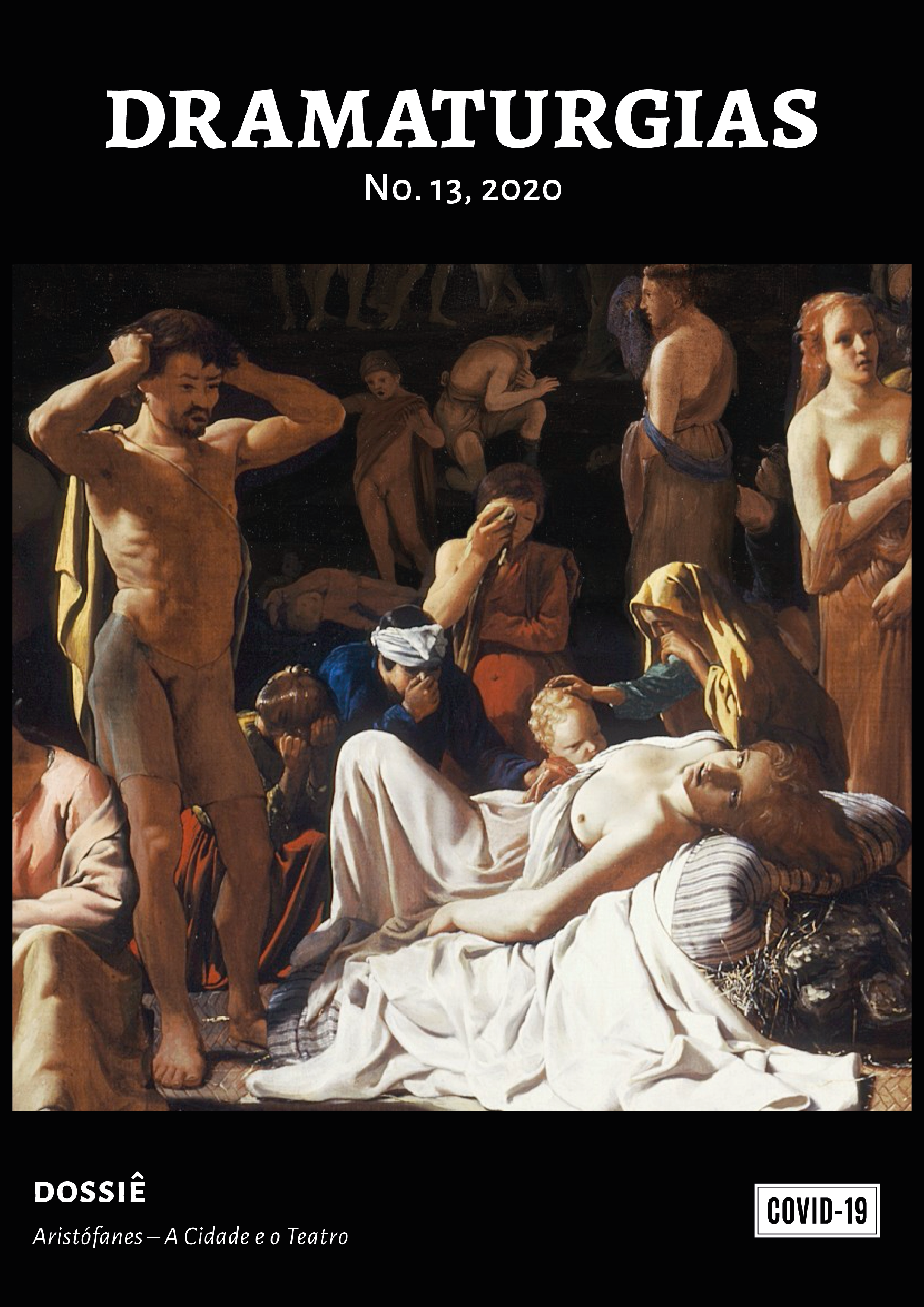'Honest and good citizen': The Informer in Aristophanes’ Plutus
DOI:
https://doi.org/10.26512/dramaturgias.vi13.31058Keywords:
Pluto. Informer. Impostors.Abstract
Hostility against informers is characteristic of Aristophanes’ comedy ”“ evident in denigrating expressions towards his figure or as a form of insult ”“ and there are three comedies that have him among his characters: Acharnians, Birds and Plutus. In this last one, the informer is given the possibility of expressing his claims more extensively, as well as arguing and defending his way of life, to which he remains faithful, immune to any transformation. We propose a Spanish translation of the scene where he intervenes (ll. 550- 958), enriched with notes, and subsequent analysis of its most important aspects.
Downloads
References
BUIS, E. El juego de la ley. La poética cómica del derecho en las obras tempranas de Aristófanes (427-411 a.C.). Madrid: Dykinson, 2019.
BUIS, E. J. “Law and Greek Comedy”. In: M. Fontaine & A. C. Scafuro (eds.). The Oxford Handbook of Greek and Roman Comedy. Oxford: Oxford University Press, 2014, pp. 321”“339.
BURKERT, W. Greek Religion. Cambridge (MA): Harvard University Press, 1985. CARRIERE, J.C. Le carnaval et la politique. Une introduction à la Comédie grecque,
suivre d'un choix de fragments. Paris: Les Belles Lettres, 1979. CARTLEDGE, P. Aristophanes and His Theatre of the Absurd. London: Bristol
Classical Press, 1990.
CORNFORD, F.M. The Origin of Attic Comedy. Michigan: University of Michingan
Press, 1993
COULON, V. (ed.) Aristophane: Texte établi par V. Coulon et traduit par H. Van
Daele. Paris: Les Belles Lettres, 1923-1930.
DILLON, M. “Topicality in Aristophanes' Ploutos”. In: ClAnt VI (1987): 155-83. DOGANIS, C. K. “La sycophantie dans la démocratie athénienne d'apré€s les
comédies d'Aristophane”. In: Journal des savants 2 (2001): 225-248. DOVER, K.J. Aristophanic Comedy, Berkeley-Los Angeles: University of California
Press, 1972.
FERNÁNDEZ, C. N. (ed.) Aristófanes: Pluto. Introducción, traducción y notas
de Claudia Fernández. Buenos Aires: Editorial Losada, 2011.
59 “Le Sycophante se défend d’être un coquin, c’est assez naturel, et non moins naturellement il se croit lésé; là ouÌ€ il dépasse la mesure, c’est lorsqu’il accuse les autres de détenir l’argent qu’il devrait posséder: en cela surtout il est dans son roÌ‚le”. (van daele, en coulon 1930: 130).
FERNÁNDEZ, C. N. "Filólogos devenidos traductores". In: T. Ribeiro Barbosa, A. Palma & A.M. Chiarini (eds.). Teatro e traduçao de teatro, vol. 1. Belo Horizonte: Relicário EdiçoÌ‚es, 2017, pp. 95-123.
FISHER, N. Hybris: A Study in the Values of Honour and Shame in Ancient Greece. Warminster: Aris and Phillips, 1992.
GRIFFITH R. & MARKS R. A Funny Thing Happened on the Way to the Agora: Ancient Greek and Roman Humour. Kingston: Legacy Books Press, 2007. HANSENM.H. AthenianDemocracyintheAgeofDemosthenes:Structure,Principles
and Ideology. Oxford: Blackwell, 1991.
HARRIS, E. M., D. F. Leão & P. J. Rhodes (eds.) Law and Drama in Ancient Greece.
London: Duckworth. 2010.
HARVEY, D. “The sykophant and sykophancy: vexatious redefinition?”. In: P.
Cartledge, P. Millet & S. Todd (eds.). Nomos: Essays in Athenian Law, Politics
and Society. Cambridge: Cambridge University Press, 1990, pp. 103-21. HEBERLEIN, F. “Zur Ironie im 'Plutos' des Aristophanes”. In: WJA N.F. VII
(1981): 27-49.
JOUAN, F. “Les tribunaux comiques d’Athé€nes”. In: J. Jouanna (ed.). Le théá‚tre
grec antique: la comédie, Actes du X Colloque de la Villa Kérylos à Beaulieu”“sur”“
Mer, 1”“2, octobre 1999, Cahiers 10 (2000): 83”“98.
KONSTAN, D. & DILLON, M.“The ideology of Aristophanes' Wealth”. In: AJPh
102 (1981): 371-94.
LIANERI, A. & ZAJKO, V. (eds.) Translation and the Classic. Identity as Change in
the History of Culture. Oxford: Oxford University Press, 2008.
LOFBERG, J. Sycophancy in Athens. Chicago, 1976.
MAURACH, G. “Interpretationen zur Attischen Komödie”. In: AClass 11 (1968):
pp. 1-24.
MAZON, P. “La farsa en Aristófanes y el origen de la comedia en Grecia”. In:
Cuadernos de Arte Dramático. Suplementos de estudio no 16 (1953).
MCLEISH, K. The Theatre of Aristophanes. Bath: Thames & Hudson, 1980. MEDDA, E. “Aristofane e il monologo”. In: P. Mureddu & G. F.Nieddu (eds.).
Comicità e riso tra Aristofane e Menandro. Amsterdam: Adolf M Hakkert Editore,
2006, pp. 91-112.
MURRAY, G. Aristophanes: a Study. Oxford: Clarendon Press, 1965. OSBORNE, R. “Vexatious litigation in classical Athens: sycophancy and the
sykophant”. In: P. Cartledge, P. Millet & S. Todd (eds.). Nomos: Essays in Athenian Law, Politics and Society. Cambridge: Cambridge University Press, 1990, pp. 83-102.
PELLEGRINO, M. La maschera comica del Sicofante. Lecce: Pensa Multimedia, 2010.
PICKARD-CAMBRIDGE, A. Dithyramb, Tragedy and Comedy. Oxford: Clarendon Press. 1927.
REVERMANN, M. Comic Business. Theatricality, Dramatic Technique, and Performance Contexts of Aristophanic Comedy. Oxford: Oxford University Press, 2006.
RUBISTEIN, L. “Volunteer Prosecutors in the Greek World”. In: Dike. Rivista di storia del diritto greco ed ellenistico 6 (2004): 87-113.
SIFAKIS, G. “The Structure of Aristophanic Comedy”. In: JHS CXII (1992): 123-142.
SOMMERSTEIN, A. (ed.) The Comedies of Aristophanes, vol. 11. Wealth. Edited with translation and notes by Alan H. Sommerstein, Warminster. Aris & Phillips 2001
SOMMERSTEIN, A.H. The Comedies of Aristophanes, vol. 1. Acharnians, edited with translation and notes by Alan H. Sommerstein. Warminster: Aris & Phillips, 19923.
TODD, S.C. “The personnel of Procedure”. In: The Shape of Athenian Law; 1993, pp. 77-97.
USSHER, R.G. Aristophanes. Oxford: Oxford University Press, 1979.
VAN LEEUWEN, J. Aristophanis. Cum Prolegomenis et commentariis. Editit
J. Van Leeuwen J. F. Leiden: Lugduni Batavorum, 1893-1906.
VENUTI, L. The Translator's Invisibility: A History of Translation. London: Routledge,
1995.
ZIMMERMANN, B. “L'organizzazione interna delle commedie di Aristofane”.
In: Dioniso LVII (1987): 49-64.
Downloads
Published
How to Cite
Issue
Section
License
Autores mantém os direitos autorais e concedem à revista o direito de primeira publicação, com o trabalho simultaneamente licenciado sob a Licença Creative Commons Attribution que permite o compartilhamento do trabalho com reconhecimento da autoria e publicação inicial nesta revista.



